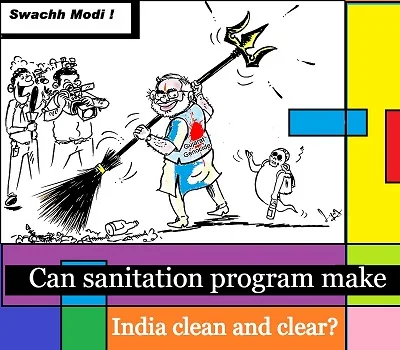Can Sanitation Program Make India Clean And Clear?
Introduction:
Mahatma Gandhi, the father of our nation, envisioned a clean India where sanitation, hygiene, and cleanliness were integral components. For him, 'sanitation ahead of independence' reflected the profound importance he placed on cleanliness. In 2014, to realize this long-cherished dream, the 'Clean India Mission' was launched on 2nd October, with Prime Minister Narendra Modi emphasizing its significance as a tribute to Mahatma Gandhi on his 150th birth anniversary in 2019.
Body:
The 'Swachh Bharat Abhiyan' aims to address issues such as open defecation, manual scavenging, and inefficient solid waste management. The construction of toilets for households and communities is central to eradicating open defecation, a practice that Prime Minister Modi rightly describes as a blot on society, particularly impacting the dignity and well-being of girls and women.
The campaign not only tackles specific challenges but also seeks to create awareness about the importance of cleanliness among the masses. From its launch, the 'Cleanliness drive' garnered positive responses from various segments of society, with locals, students, politicians, industrialists, and celebrities actively contributing. This initiative planted the seed of thought about cleanliness in the minds of millions of Indians, transforming the topic into a national discussion.
To further the cause, the government introduced city cleanliness rankings in 2016, motivating cities and states to enhance their efforts in different areas of cleanliness and sanitation. This move encouraged healthy competition and collaborative initiatives, fostering a sense of collective responsibility.
Cleanliness and sanitation are not only ethical imperatives but also play a vital role in promoting tourism in India. The country, known for its picturesque locations, historical monuments, and warm hospitality, attracts tourists from around the world. A clean and well-maintained environment not only leaves a positive impression on tourists but also contributes significantly to the country's economy by boosting tourism-related industries.
However, the success of the 'Swachh Bharat Abhiyan' is not solely measured by official statistics but by the active response it receives from the public. While similar initiatives in the past faced challenges, the current campaign's success relies on the collective responsibility of the 1.2 billion citizens. It goes beyond cleanliness of streets and public places; it extends to keeping homes, offices, and neighborhoods clean throughout the year.
Every individual's effort in this direction counts, emphasizing that cleanliness should not be solely the responsibility of sanitation workers. It must become the mission of every citizen to contribute to making India clean. The government, providing funds and building infrastructure, needs the cooperation of the people to ensure the success of this mission.
Social media platforms can be instrumental in highlighting small gestures of cleanliness and fostering a sense of collective responsibility. Education and awareness campaigns should sensitize people, especially those from lower strata, about the harmful effects of open defecation, which includes the loss of lives, stunted growth, and the spread of diseases.
To make 'Swachh Bharat Abhiyan' a success, an hour from our weekly schedule can be dedicated to cleanliness, involving all sections of society. Parents, schools, and educational institutions should play a crucial role in sensitizing children about different dimensions of cleanliness, encouraging them to adopt healthy sanitation principles.
NGOs can actively participate by guiding citizens with innovative waste reduction methods and collaborating with research institutes for new techniques. Celebrities and public figures should lead by example, amplifying the message of cleanliness through their actions.
Conclusion:
As Prime Minister Modi remarked, 'Quit India, Clean India' was the half unfulfilled dream of Bapu. It becomes the moral duty of all citizens, along with the government, to work collaboratively to make India clean and fulfill Mahatma Gandhi's unfulfilled dream. By adopting a collective responsibility and embracing the principles of the 'Swachh Bharat Abhiyan', we can contribute to the realization of a cleaner, healthier, and more prosperous India.
Also read: Essay On Gst How Will It Work In India
Also read: Essay On Honesty And Trustworthiness
Also read: Essay On Drunk Driving By Youngsters In 300 Words
Also read: Pani Adva Pani Jirva Nibandh Marathi
Also read: Rain Water Harvesting Essay In Hindi
Also read: Short Essay on World Soil Day
Also read: माझ्या गावातील पाणीपुरवठा निबं
THANK YOU SO MUCH

Thanks for this information
ReplyDelete